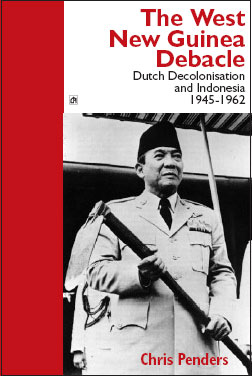The West New Guinea Debacle Dutch Decolonisation and Indonesia 1945-1962
This is a history dealing with the end of Dutch colonial rule, the early years
of independent Indonesia, the West New Guinea question, and the emergence of Papuan
nationalism. The book covers several key themes.
The Indonesian Revolution (1945 to 1949) is treated only summarily. The book chiefly
concentrates on Dutch policies and perspectives, which have so far generally been ignored in
existing English-language publications.
Netherlands-Indonesian relations between 1950 and 1958 are treated in depth, with a
description and analysis of the struggle for power between the early, more Western-attuned
and economic-rationalist cabinets, on the support of which the fate of the vast Netherlandscontrolled
export economy was dependent, and the masses, driven by Sukarno and the
populist parties. By 1957-58, with the destruction of whatever had existed in the way of
Western-style democracy, the power of the army and the Communist Party significantly
boosted, and the economy corrupted on the verge of bankruptcy, the West New Guinea
question drove Dutch-Indonesian relations to the brink, speeding the nationalisation of
the vast Dutch economic empire.
West New Guinea and Papua nationalism began as early as the 1920s and 1930s, and
by the early 1950s the Dutch had set about guiding the Papuans towards independence.
This policy had to be aborted, however, with the threat of an Indonesian invasion and the
unwillingness of the US to provide armed support to Dutch forces. As a result, Australia, too,
was reluctantly forced to abandon the Dutch.
There is sufficient documentary evidence to prove that Washington had from the beginning
remained lukewarm towards Dutch policy on West New Guinea. Throughout the 1950s, the
US attempted to balance its relations with the Netherlands and Indonesia. Even when the
Soviet-backed Indonesian armed forces stood seemingly poised for a full-scale invasion of
West New Guinea, Washington continued to refuse Dutch requests for armed intervention in
the case of an attack. US policy swung towards Jakarta under Kennedy, and West New Guinea
was sacrificed to serve US objectives in Indonesia.
Australia was forced to accept the inevitable. It had actively encouraged the Netherlands to
hold onto West New Guinea, completed agreements on economic and social cooperation, and
conducted in-depth studies about a possible Australian-Dutch defence system against Indonesian
aggression. Without US military support, however, the situation became untenable.
This book will be required reading for those seeking to understand the genesis of the situation
in West New Guinea today, where Papuan nationalism is again in the ascendant following the
recent dramatic events leading to the independence of East Timor.
|
|

AUTHOR:
Chris Penders
STATUS:
Back List
PRICE:
$49.95
ILLUSTRATIONS:
Photographs, maps
FORMAT:
Portrait; hardcover; c. 416 pages
DIMENSIONS:
228 x 152 mm
ISBN:
1863332057
|
|

